10 Best Free Social Media Keyword Research Tools

Successful content ranking depends on keyword research tools. Using these tools, you can find out how often people use your keyword, what searches they get when they type it into a search engine, and more. These keyword research tools can help you figure out the terms people are using to find content similar to yours, which will show you how popular it is. Use these keyword research tools to find out which terms or phrases get the most clicks. Then, you can organize your content flow so that each piece of content focuses on one or more of these keywords.
It can be difficult to choose which of the many keyword research tools available. Thankfully, we’ve saved you time and effort by putting together a list of the top 10 free social media keyword research tools that you can use to identify popular phrases.
1) QuestionDB

QuestionDB works more as a tool to come up with ideas by using broad keywords to display search queries that users have entered for that specific term.
To use a query DB, enter an appropriate, broad keyword. For example, shoes then hit “generate”. Please review the list of results as you receive them to get ideas for alternative search terms.
Then, you can perform a fresh search for each of these terms to get specific query results.
The goal is to come up with relevant things to write about and share, but that takes some work. It can make your social media interactions more engaging by making them more relevant.
2) Merchant Words
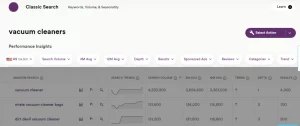
A great tool for Amazon eCommerce sellers is the Merchant Words. This tool provides you with information about product features, competition and search traffic based on billions of data points. It requires a paid subscription to upgrade and offers some of its services for free.
The fact that Merchant Words provides comprehensive reports on each search phrase is one of its greatest features. You can choose an action to test on a page or search for relevant keywords for each report. The Analyze page displays a summary of free results on an alternate page. However, finding synonyms isn’t free.
There are several tools available for merchant terms, such as:
- Digital bookshelf. This tool provides suggestions for improving your product’s ranking as well as displaying its ranking.
- Multiply for keywords. This tool can help you come up with ideas for alternative keywords.
- Products on the front page. Use this tool to find products that appear on the Amazon home page.
- Market knowledge. This tool provides information about product rankings and competitor activities.
- fresh progress. Take use of this tool to spot new keyword trends and keep a step ahead of your rivals.
- Traditional search. Analyze real Amazon searches to find out what buyers want.
- Keyword Guide. If you’re short on time or just not sure where to start when it comes to keyword research, Merchant Words can handle all the work for you.
- Listing Consultant. Hire professionals to optimize your listings and develop your product descriptions.
- ASIN ++. Find long-tail keywords associated with your product using this tool.
3) Keysearch
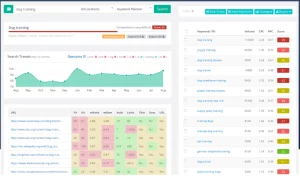
Keysearch is an online tool for keyword research. While it’s not exactly free, it does offer a pretty good one-month free trial, making it a great deal for any novice content marketer.
You can identify profitable keywords as well as terms that are related to your niche by using the Keysearch keyword tool. A keyword search will give you hundreds of keywords with volume and cost-per-click information if you just enter the main keyword.
To search for related terms, you can also use a large keyword database, Related Keywords, Google Suggest, Amazon Suggest, YouTube Suggest, and Finders.
When you enter the URL of one of your competitors and search for the keywords they are ranking for, you have a lot of long-tail keywords to find. Options are available. It also includes sophisticated filtering capabilities and a YouTube research area.
4) Keyword.Guru
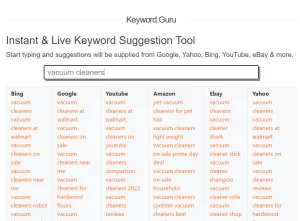
Suppose you are looking for a basic keyword research tool without any analytics features. In this case, Keyword.Guru may be helpful. This simple tool provides long lists of keyword results from eBay, Amazon, YouTube, Yahoo, Bing, and Google. Long-tail keyword phrases and broad terms are both searched.
As I mentioned, it doesn’t check the results. You have the option to export search results or save them to your account.
Nevertheless, if you need a keyword list for brainstorming purposes or to optimize your listings on Amazon and eBay, this is a useful tool to consider.
5) Instakeywords
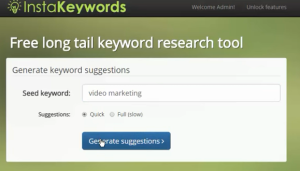
A free long-tail keyword research tool is Instakeywords.
Hundreds of keyword ideas relevant to your specific keyword data, including global and local search traffic, trends, and cost per click (CPC), will be provided by the tool Instakeywords. It can be used to obtain competitor keyword data, which is usually inaccessible, and identify terms that are easy to rank for.
With the Chrome browser, you can use Instakeywords as an extension.
6) WordStream

WordStream allows you to research keywords and keyword sequences and focus your search by country or industry. Each keyword’s bid range, competition, and search volume are displayed in the search results.
WordStream can be used in several ways:
WordStream has no learning curve and is very easy to use. It’s important to know which keyword phrases, search terms, and competing keywords to check. Within seconds of typing them into the search window, WordStream will provide you with results.
It really is that simple.
With Wordstream’s Google Ads Performance Grader, you can score your ad campaigns and gain insight into areas that need optimization and areas where money is being wasted.
One drawback of this tool is the lack of categories to refine your search and focus on a particular audience. Only industry and nation are available for search.
7) Google Keyword Planner
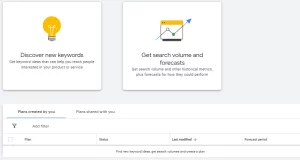
An essential tool for your toolbox, if you run Google Ads, is the Google Keyword Planner. You can also see the average cost per click (CPC) as well as the amount of monthly searches for your chosen keywords. You have the option to upload existing projects or keywords or search for keywords.
There are various benefits of using Google Keyword Planner.
It’s free, for starters.
It will also give you a quick estimate of search volume or the number of people who are searching for your chosen terms.
Third, it will give you the average cost per click (CPC) for each keyword, allowing you to estimate the value of investing in that particular ad. Finally, it can help you find some new keywords that you haven’t yet optimized for.
You can then use this data to better target your ads and increase the likelihood that users searching for those specific terms will find you.
8) Wordtracker
![]()
With Wordtracker, you may do keyword research and obtain and assess data on terms, search volume, organic search traffic, sponsored search traffic, competition, and other term-related aspects. It accomplishes this by applying a variety of algorithms to determine which keywords are most relevant to a certain product or website.
Word Tracker provides comprehensive keyword research results. It shows the level of popularity of certain terms. In addition, it shows the amount of Google searches performed for them, the frequency with which they appear in organic searches, and the amount of traffic they receive from sponsored search ads. This way, you can determine the type of content that is likely to rank high on Google and adjust your website accordingly.
The most important thing it shows is the amount of web pages that have optimized keywords in both their title tags and backlink content.
9) Ahrefs

The keyword generator offered by Ahrefs is free and searches Google, Bing, YouTube and Amazon. For each time frame you select, it performs exhaustive keyword searches on billions of queries. Ahrefs’ free keyword generator includes long-tail keyword searches plus the following:
Highly Detailed Competitor Data: Incredibly Complete Competitor Data Identify the keywords your competitors are ranking for and gauge the intensity of their following. Additionally, you can see their spending on content marketing, social media, and paid advertising.
Keyword Analysis Tool: Add more filters to see only the most popular keywords and those that have increased or decreased traffic recently for a thorough study of your top keywords. This data can also be exported to Excel for additional analysis.
Search Traffic History: Review your site’s search traffic history to see how it has fluctuated over time and to determine which search terms are the most popular. Remember that search trends can change quickly, so the information you collect now may not be relevant in six months.
Awesome Bar Graphs: Use interactive bar graphs to see how your site traffic is performing across all the keyword buckets. Key patterns in search engine rankings and traffic sources over time can be easily identified with the help of these visual representations.
10) Moz Keyword Explorer

You can use Moz Keyword Explorer for free. As with other tools, you can type your search word into the search text box. The primary distinction is that you can only view your search results with corporate information after making an account and entering your name, email address, and other personal data.
Additionally, you are limited to 10 keyword searches per month. An aggressive keyword approach is hardly enough to execute.
If you’re okay with this low search restriction, Keyword Explorer has some great capabilities available. These features include:
- Searching using query structure
- Check the SERP results.
- Estimate the expected keyword search volume.
- Export information.
- Get a score that reflects the difficulty of classifying a word.
- Find competitive keywords.
ALSO READ:
- VPN Apps for iOS
- iPhone Spy Apps
- CAD Programs
- Best Antivirus Apps
- YouTube to GIF Converters
- CAD Software for Mac
- Free VPN Chrome Extensions
In summary, not every tool will meet your needs for keyword research. Keyword research is an essential component of any content strategy. Free keyword research tools are useful, but they can also be limited. This is something you’ll typically encounter when experimenting with some of these tools.
Once your content efforts begin to bear fruit, we recommend that you test them and scale up to a paid model.

